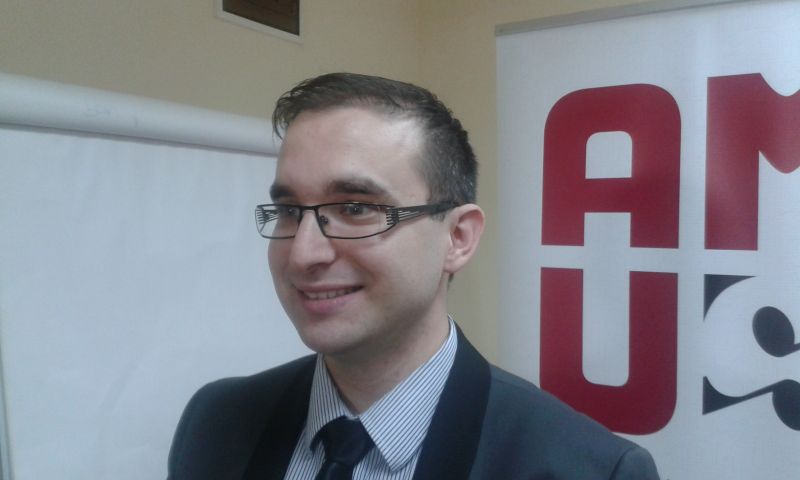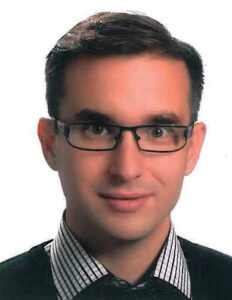
The proposed draft law on the collective excercise and protection of copyright and related rights should have positive impact as for the journalists and media workers, so as for the BiH society as a whole.
Sarajevo, March 28th,2024. – Bosnia and Herzegovina (BiH) is in the process of updating law which regulates intellectual property rights ,since through Stabilization and Association agreement it has commited itself to ensure the level of intellectual property protection similar to that of the European Union countries (EU). All these activities are undertaken within the framework of the EU project of support to the intellectual property rights in Bosnia and Herzegovina, which is funded by the EU.

PHOTO: Private archive
Haris Hasić, an expert on the protection of copyright and related rights, in an interview for the BH journalists says that public consultations are underway on the Draft Amendments to the Existing Law on Copyright and Related Rights (Official Gazzete of BiH no.63/10) and the Draft Law on Collective excercise of copyright and related rights, which is an entirely new law and a substitude to the existing Law on collective excercise of copyright and related rights(Official Gazzete of BiH no.63/10). Hasić points out that BiH has not reformed the legal area on intellectual property since 2010. Although in the meantime serious changes have happened in Europe and world in this area – the EU has adopted more directives,important for the protection of copyright rights and works of journalists and media.
„These two laws are of specific interest for the journalists and media workers because these figures in the framework of their professional obligations create, and also use copyrighted works.The Law on Copyright and Related Rights regulates what is an authors work, who can be considered as an author, what rights does author have in relation to his/hers work, when the authors work can be used without permission of the author and the obligation to pay compensation, court and other procedures for the protection of copyright rights as many other issues. “ says Hasić and adds how journalist and media community in BiH should understand the importance of ,,changes that will be brought in connection with the realization of collective rights, and what will be the role of an non-profit associations for the protection of copyright works and certain groups of authors“.
What is new in these two laws which will regulate protection of copyright and related rights in a new, European way?
Hasić: As drafts of these laws were made within a framework of the EU project, many of the new provisions are based on new directives, best passed by the EU. This is an excellent approach, since the EU rules are, in principal, one of the best in the world for this area, and Bosnia and Herzegovina is obliged to transpose them into its legislation anyway, if we want to be a member of the EU and fulfill the previously assumed obligations.Thus, for example,the institute of the ,,orphan” of author’s work will be introduced, which will represent the author’s work that is legaly protected, but the author cannot be identified or it is not possible to communicate with the author in order to obtain permission, so the legislator gives permission in certain circumstances to use these works after conducting a thorough search procedure. Qualified use of author’s works is allowed for their use in digital and cross-border teaching, author’s works are unavailable on the market and for text and data mining, including for the purpose of scientific research. The rules that will make it easier for blind and partially sighted persons to access printed works of authorship, which is an obligation undertaken by Bosnia and Herzegovina by signing the Marrakesh Agreement on Access to Printed Works for Persons with Visual Impairment, are being regulated. And finally, the right of broadcasting and rebroadcasting is regulated, the issues of royalties and records of income from the use of copyrighted works are adjusted, a new related right is introduced for informative publications, and a chapter on public communication of copyrighted works that are shared via the Internet is introduced.
What are the positive proposals in these drafts that will reflect on the right to protect the author’s work of journalists and media in Bosnia and Herzegovina?
Hasić: For the first time journalistic works are being listed among protected copyright works. Journalistic works, were, ofcourse, previously protected as copyright works alongside an opened and inclusive definition of copyright work, but the positive proposal is that the journalist works are specifically stated and defined in the draft law. This should provide more legal security, and clarity for the journalists during protection of their rights at the court. Therefore, the draft law introduces a new copyright on informative publications, which will bring direct benefits for journalists and media workers and their author’s texts. In this context, legal provisions authorize the publishers of publications to control the use of journalistic content and charge a fee for that use. It was suggested that the journalists – authors have the right to part of the compensation which publishers of the informative publications achieve, so that this right should result as an additional source of income for the journalists. It was also proposed to introduce rules which would give more control to journalists over searching and posting their work on internet, rewritten from the famous EU Directive on copyright rights on a unique market. In draft law which regulates collective exercise of copyright rights, also is predicting founding of a collective organization which will collectively exercise (protect) copyright and related rights of journalists.
Such a collective organization could better fight for the realization and protection of copyrights of journalists in Bosnia and Herzegovina and represent additional sources of income for journalists.
Not all the proposed provisions in the draft laws are binding or in accordance with European standards. What is essentially disputed, and what could have a negative impact on the protection of the copyright of journalists and the media?
Hasić: It is proposed to change the existing rules on copyright works created in the employment relationship. In the current law, copyright property rights over the work/media content created in the employment relationship are transferred to the employer for a period of five years, unless otherwise expressly stipulated in the author’s employment contract. After those five years, the rights are returned to the author, and the employer must pay for a new transfer of rights and to continue using the author’s work. The draft proposes to change this rule so that the rights are transferred to the employer permanently, if the author does not agree otherwise with the employer in the employment contract or other legal instrument. In this way, journalists lose part of the control over the fruits of their work, as well as an additional source of income, and the rights given to journalists and media workers in the existing legislation are taken away. When it comes to the use of generative artificial intelligence (AL), the draft proposes to allow free mining of text and data without the need to obtain permission from the author or pay fair compensation. The draft contains provisions according to which the author can explicitly prohibit text mining, but it is still not clear how he will be able to do this in practice. Such a provision, which may represent an error in the draft law, could be detrimental to journalists and media workers, but also potentially contrary to international agreements signed by Bosnia and Herzegovina in the field of intellectual property. Finally, even explicitly listing journalistic works as a type of protected author’s work is potentially problematic because it lists only three types of journalistic author’s works: articles, photographs, and audiovisual contributions. In their professional activity, journalists create a significantly wider circle of mental creations than these three, so this clause would have to be changed during public consultations.
PHOTO: Radio Brčko



